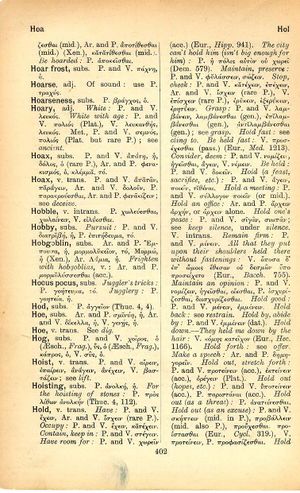hoe: Difference between revisions
From LSJ
ὅταν δὲ τἄμ' ἀθυμήσαντ' ἴδῃς, σύ μου τὸ δεινὸν καὶ διαφθαρὲν φρενῶν ἴσχναινε παραμυθοῦ θ' → whenever you see me despondent over my situation, do what you can to lessen and relieve what is wild and senseless in my thinking | whenever you see me despondent, you must cure the grim derangement of my mind and encourage me
(D_4) |
(Gf-D_4) |
||
| Line 1: | Line 1: | ||
{{Woodhouse1 | {{Woodhouse1 | ||
|Text=[[File:woodhouse_402.jpg|thumb|link= | |Text=[[File:woodhouse_402.jpg|thumb | ||
|link={{filepath:woodhouse_402.jpg}}]]'''subs.''' | |||
Ar. and P. [[σμινύη]], ἡ, Ar. and V. [[δίκελλα]], ἡ, V. γενῄς, ἡ. | Ar. and P. [[σμινύη]], ἡ, Ar. and V. [[δίκελλα]], ἡ, V. γενῄς, ἡ. | ||
'''v. trans.''' | '''v. trans.''' | ||

